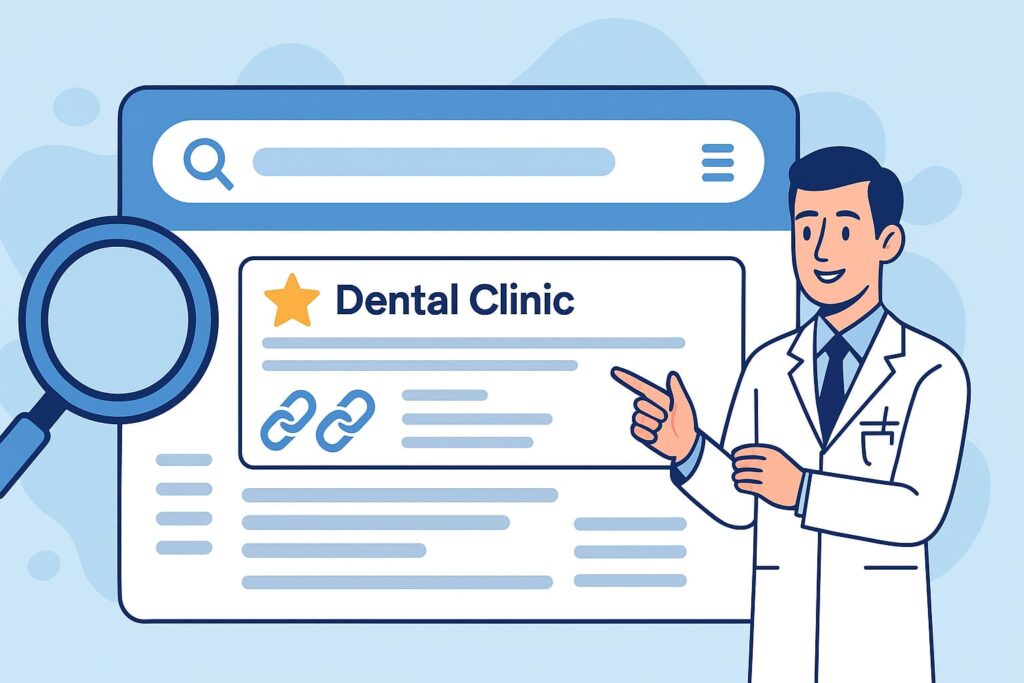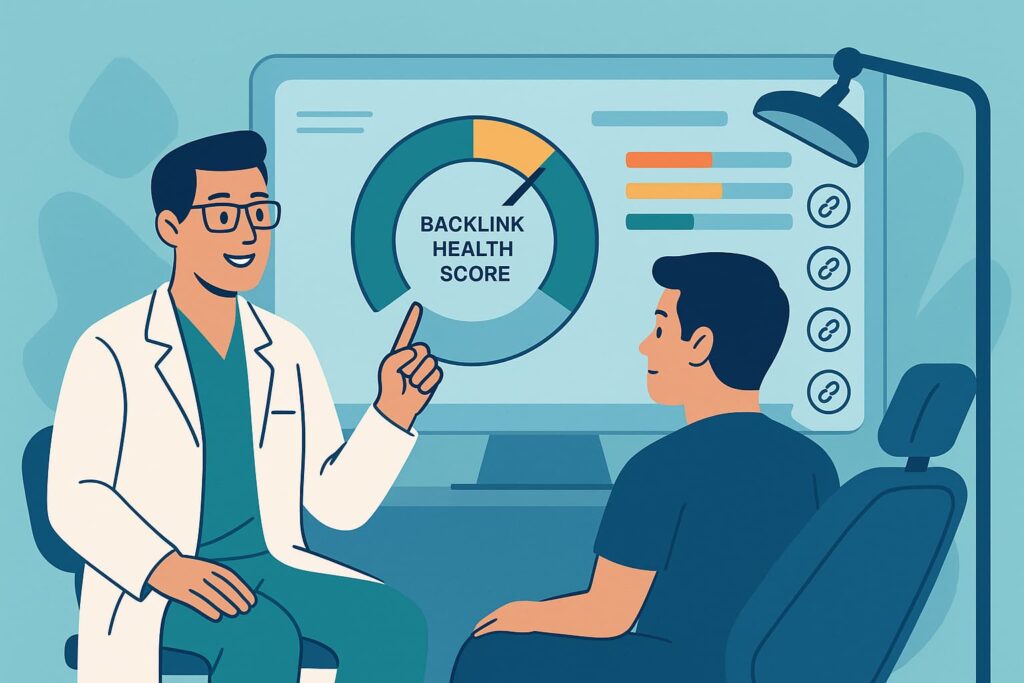For dental practices, building trust starts online, long before a patient books an appointment. Most people search for services like “dentist near me” or “teeth whitening in [city]”, and whether your practice appears depends largely on your digital visibility.
Backlinks are a key part of this visibility. They act as signals of credibility, but low-quality or irrelevant links can damage both rankings and reputation. In healthcare, where accuracy and trust are critical, this risk is even greater.
Healthcare-focused backlink audits address these issues by combining SEO analysis with compliance checks, reputation protection, and patient-focused accuracy. This article explains why these audits are essential for dental practices and how to apply the insights for long-term results.
The Role of Backlinks in Dental Practice SEO
Search engines use backlinks to evaluate relevancy and trustworthiness. A good backlink profile frequently decides whether patients find your practice or a competitor in competitive local marketplaces.
Backlinks as Indicators of Authority
A backlink acts as a vote of confidence from one site to another. Links from authoritative sources—like medical directories, chambers of commerce, or news outlets—signal that your practice is credible and valuable, boosting rankings.
Critical Importance for Local SEO
For dental practices, search success is local. Patients search for terms like “dentist in [city]” or “emergency dental care near me.” Backlinks from community groups, local directories, and regional news confirm your geographic relevance and improve local rankings.
The Consequences of Low-Quality Links
Not every backlink is useful. Spammy directories, unrelated websites, and low-authority blogs can hurt SEO, mislead search engines, and potentially result in penalties. Dental practices lose visibility and reputation by associating with untrustworthy sources.
Why Standard Backlink Audits Fall Short in Healthcare
Generic backlink audits provide technical data but often overlook key needs of healthcare providers: trust, compliance, and reputation. Dental practices operate in a regulated field where accuracy and professionalism are critical, and ignoring these factors can lead to ranking penalties or patient distrust.
Focus on Rankings, Not Patients
Traditional backlink audits often evaluate links solely through the lens of SEO:
- Metrics like Domain Authority;
- Anchor text distribution;
- Number of referring domains.
While these factors are valuable, audits often ignore the healthcare-specific context—where patient trust and accurate information carry equal, if not greater, importance.
Compliance and Ethical Considerations
Healthcare providers are subject to severe rules. A backlink from an untrustworthy or non-compliant site might harm rankings while also raising legal or ethical concerns.
Standard SEO audits frequently ignore this element, making strategies exposed to hazards that extend beyond search performance.
Reputation Management
For a dental office, reputation is crucial. A link from a spam site or an irrelevant source may appear insignificant to a basic SEO auditor, but it can raise red flags among patients. Healthcare-focused audits concentrate on reputation management alongside technical factors to ensure your web profile represents your practice’s professionalism.
Key Components of a Healthcare-Focused Backlink Audit
A healthcare-focused backlink audit is a structured process that goes beyond basic SEO checks. It reviews how search engines rank your site and how patients see it online. The audit combines technical analysis with compliance, reputation, and directory accuracy to maintain and improve a dental practice’s digital presence.
1. Comprehensive Backlink Inventory
The first step is to get a thorough picture of your backlink profile. Healthcare-focused auditors employ several SEO databases to capture all links referring to your clinic, guaranteeing that nothing is missed.
This includes traditional SEO links, citations from medical directories, and mentions on healthcare networks.
2. Link Quality and Relevance Analysis
Each link is assessed not just for authority but for relevance to healthcare and dentistry.
For instance, a backlink from Healthgrades or the American Dental Association is far more valuable than one from a random lifestyle blog.
3. Directory and Citation Accuracy
Healthcare audits place special emphasis on directories like Zocdoc, Healthgrades, and Yelp. Inconsistent Name, Address, and Phone number (NAP) information can confuse patients and search engines alike. A specialized audit ensures accuracy across all directories.
4. Compliance and Ethical Review
Auditors check for links that might pose compliance risks—such as sites making unverified medical claims or engaging in unethical promotional practices. This adds an extra layer of security that generic audits don’t provide.
5. Toxic Link Identification and Disavowal
Some links are actively harmful, such as those from spam networks or irrelevant international domains. Healthcare audits flag these risks and prepare disavow files for submission to Google, protecting your practice’s reputation.
6. Anchor Text Distribution
The clickable portion of a link, known as anchor text, should include language that is patient-friendly and natural. Anchors that are overly optimized, such as “best cheap dentist,” may come out as manipulative. Your anchoring will be in compliance with professional requirements thanks to a healthcare audit.
7. Local SEO Enhancement
Auditors also review backlinks from local organizations, schools, charities, or chambers of commerce. Strengthening local links directly supports patient acquisition in your area.
Benefits of Healthcare-Focused Backlink Audits for Dental Practices

Unlike general audits that focus only on link quality or rankings, healthcare-focused audits evaluate how backlinks influence patient trust, regulatory compliance, and long-term success. For dental practices, this targeted approach helps build visibility, attract more patients, and strengthen credibility within the community.
- Preserves Patient Trust: Credibility and patient trust are increased by a well-maintained backlink profile.
- Enhances Rankings: Links pertaining to healthcare increase search visibility and authority.
- Lowers the Risk of Noncompliance: eliminates sources that are dubious or noncompliant.
- Improves Reputation: Get rid of spam links to maintain your practice’s affiliation with reliable websites.
- Provides Insights: Outlines precise actions to enhance your link profile and expansion.
Best Practices for Dental Practices After a Backlink Audit
Completing a backlink audit is only the first step; what’s really important is putting the results into action. Dental practices that use audit insights gain power, preserve their reputation, and increase exposure in competitive local markets. Audit results should be seen as part of a long-term strategy to sustain digital health.
Adopting regular, proactive practices ensures that your backlink profile improves rather than declines over time. Some of the more successful steps are:
Maintain Directory Accuracy
To avoid inconsistencies, keep your medical and local directory information up to date on a regular basis. Even small errors in your name, address, or phone number (NAP) might confuse patients and search engines.
- Check platforms like Google Business Profile, Yelp, Healthgrades, and Zocdoc at least quarterly.
- Remove duplicate listings that may split authority across profiles.
- Make sure hours of operation and contact details are always current.
Create Quality Content
One of the most effective ways for dental practices to earn natural backlinks is by publishing content that offers real value. Instead of relying on promotions, share resources that patients and other sites can trust and reference.
Guides on preventive care, routine treatments, and oral hygiene highlight expertise, while FAQ pages answer common questions. Case studies or before-and-after examples (with consent) further demonstrate skills in a clear and credible way.
Build Local Partnerships
Connections within the community often lead to strong and relevant backlinks. Sponsoring local groups or events increases both online presence and community visibility. Working with schools on dental health programs benefits residents while raising awareness of the practice.
Supporting charity initiatives or sponsoring sports teams helps the practice become more recognized and trusted locally. Collaborating with nearby healthcare professionals, such as orthodontists or pediatric specialists, creates referral opportunities and generates reliable backlinks that strengthen authority.
Engage with Media Outlets
Dental practices can expand their credibility by serving as expert sources for local and industry media. Media features typically provide high-quality backlinks that improve search rankings. Offering expert commentary through services like HARO helps dentists appear in news stories as trusted professionals. Writing guest articles for dental blogs, health magazines, or professional associations also builds visibility.
Press releases about new services, certifications, or community involvement ensure important updates are shared by reputable outlets.
Monitor Backlinks Continuously
Your backlink profile will evolve over time as websites update, remove, or change material. Ongoing monitoring allows you to solve issues as they arise, before they have an impact on your rankings.
- Run mini-audits every 3–6 months to catch harmful or lost links.
- Track toxic links and submit disavow requests when necessary.
- Document new backlinks to measure progress and see which strategies deliver the best results.
Case Example: The Impact of a Healthcare-Focused Audit

Consider a dental practice that had invested heavily in SEO but wasn’t seeing results. A standard audit revealed toxic links from outdated directories and irrelevant blogs, but failed to notice inconsistent information across healthcare platforms.
A healthcare-focused audit, however, revealed that the practice’s phone number changed across three major medical directories, leading to patient confusion and ranking penalties. Once fixed, the clinic experienced a 30% increase in appointment reservations within three months, proving the value of specialized backlink audits.
Choosing the Right Backlink Audit Service for Your Dental Practice
When selecting a service, ask the following questions:
- Do they have healthcare experience? A provider familiar with healthcare directories and compliance issues offers better protection.
- What databases do they use? Multiple data sources ensure comprehensive coverage.
- Do they provide actionable recommendations? Beyond identifying issues, the best services outline clear next steps.
- How do they handle compliance? Ensure they review links for ethical and regulatory risks.
3XE Digital stands out as a service that meets these criteria. They provide in-depth backlink audits and removal solutions to help dental practices identify toxic links, assess link quality and anchor text, and perform competitive link gap comparisons.
The Future of Backlink Audits in Dental SEO
Search engines are emphasizing the quality and relevancy of backlinks rather than the quantity. For dental clinics, this implies audits must be planned with healthcare in mind. The goal is not simply to boost search ranks, but also to increase patient trust and trustworthiness.
Key developments shaping backlink audits include:
- AI-Driven Reviews: AI makes it easier to spot harmful or low-quality links with greater speed and accuracy.
- Reputation Tracking: Backlink data is now combined with patient reviews to show a fuller view of online presence.
- Continuous Oversight: Audits are moving toward constant monitoring to detect and fix problems quickly.
Conclusion
Backlinks affect both search visibility and patient trust. For dental practices, poor-quality links can harm credibility, making healthcare-focused backlink audits essential. These audits address compliance, accuracy, and reputation while improving SEO. Regular audits should be part of every practice’s strategy to protect rankings, strengthen reputation, and help patients find and trust their services.
